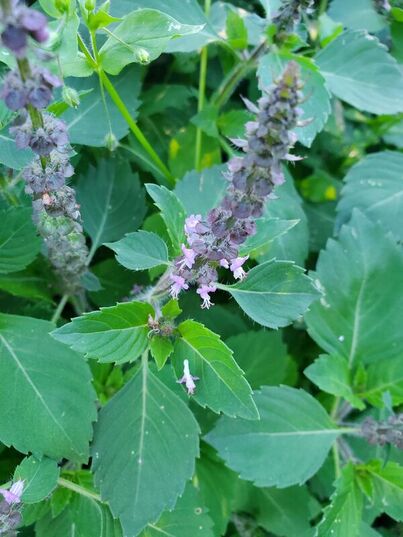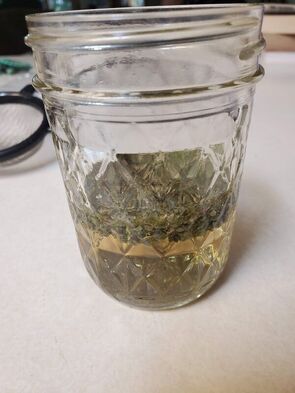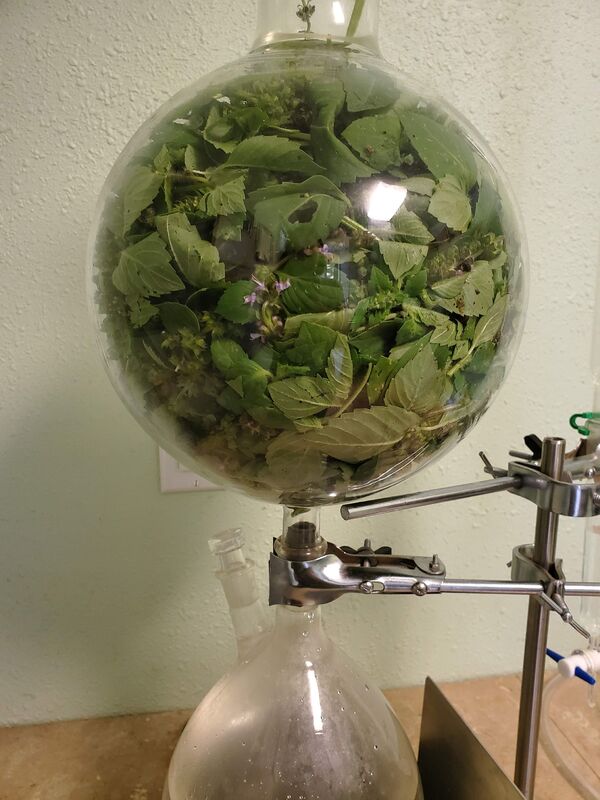or Holy Basil (Ocimum sanctum)
Growing Tulsi
There are several different varieties of holy basil – some perennial and others annual. The holy basil variety that we grow is commonly known as Rama, and is an annual that we plant from seed. Like the common culinary basil, Ocimum basilicum, tulsi is native to India and western Asia. So it prefers hot weather and lots of sunshine. Here in the Northwest, we find that it is best to wait until sometime in early June to plant the tiny black seeds. The seeds will germinate in as little as 1 week or 2, and leaves should be ready for harvest in 3-4 weeks. We grow it in our veggie garden where it gets watered regularly, which helps it grow vigorously. Basils, including holy basil, can grow well in containers, just be sure to water it regularly to keep it from drying out.
Unlike culinary basil, it is okay to let tulsi or holy basil go to flower. Both flowers and leaves are used, so you can cut entire aerial part of the plant including the flowers. While typically for many herbs, especially culinary herbs, it isn’t recommend to let them flower because it will reduce the quality & strength of their flavor – for tulsi the flowers are useful and part of the benefits of the herb as a whole. Leave about 6 inches of the plant behind to continue to grow and provide more harvests throughout the summer. Regular harvesting of about 1/3 of the plant encourages the plant to growing bushy and put on more leaves. During hot weather the plants tend to bolt or put on seed heads. It is easy to pinch these back about one-inch below the flower, to keep the plant from continuing the process of producing seeds, which can make the leaves turn bitter and much less flavorful.
Preserving
To save the goodness of tulsi for later use, dry some of the leaves. Tulsi has a high moisture and oil content so it can take a bit longer to dry than other basils. It dries well laid out in a single layer on a drying rack with good airflow, out of direct sunlight. Small amounts of leafy stems can be put in a brown paper bag and hung to dry in a warm dry place. If you place the brown paper bag in the sun, the leaves should be dry in just a few days, otherwise plan for them to be dried in a week or so. Put the dried leaves in a glass container with a lid and store in a cool dark cupboard until needed. You can also preserve the goodness of tulsi by making a tincture. Take an 8 ounce jar, fill loosely packed with tulsi that has been cut into 1 to 2 inch pieces. Cover with alcohol of your choice (at least 40%), and let steep for 6 to 8 weeks. Strain and then bottle for storage. We like a wheat based vodka produced in eastern Washington.
As an adaptogen, tulsi can be used every day to help support you during stressful times and all year round. It is most commonly made into teas, tinctures and elixirs (herbs infused in alcohol & honey), which taken daily moves a person toward health and well-being. Tea is the most common way to prepare and consume tulsi. Because of its high oil content, tulsi tea shouldn’t be steeped for more than 10 minutes. As a tea or tonic, holy basil has been shown to reduce general stress and anxiety.
Tulsi, besides having a delightful flavor, is also helpful:
- as a brain stimulant to help clear “foggy brains”
- decreases blood glucose and total cholesterol (as shown in a clinical trial of people with type-2 diabetes)
- provides beneficial actions for the heart (slight blood thinning, promotes circulation)
- high in eugenol which is helpful in decreasing pain often associated with arthritis
- many positive effects on the digestive system - relieving heartburn, bloating & gas
- Tulsi may have an antifertility effect on both men and women. It should not be used by women who are pregnant or couples wishing to conceive.
- Because of its slight blood thinning properties, it should not be taken by people currently taken blood thinner medications.
- People with diabetes should consult with a doctor to determine if insulin levels need adjusting if consuming tulsi
As daylight lessens, holiday stresses approach and just daily activities sometimes get us down, consider tulsi (holy basil) as an addition to your daily routine for a spirit lifting, brain de-fogger and general choice for healthful living.
References:
- Alchemy of Herbs; Rosalee De La Forêt
- The Organic Medicinal Herb Farmer, Jeff Carpenter with Melanie Carpenter



